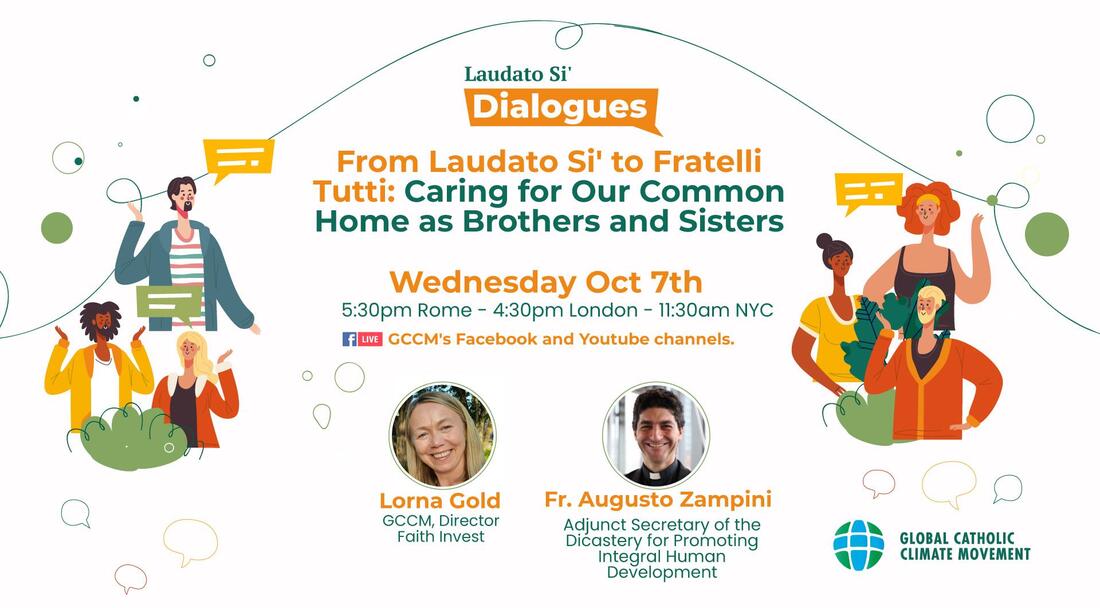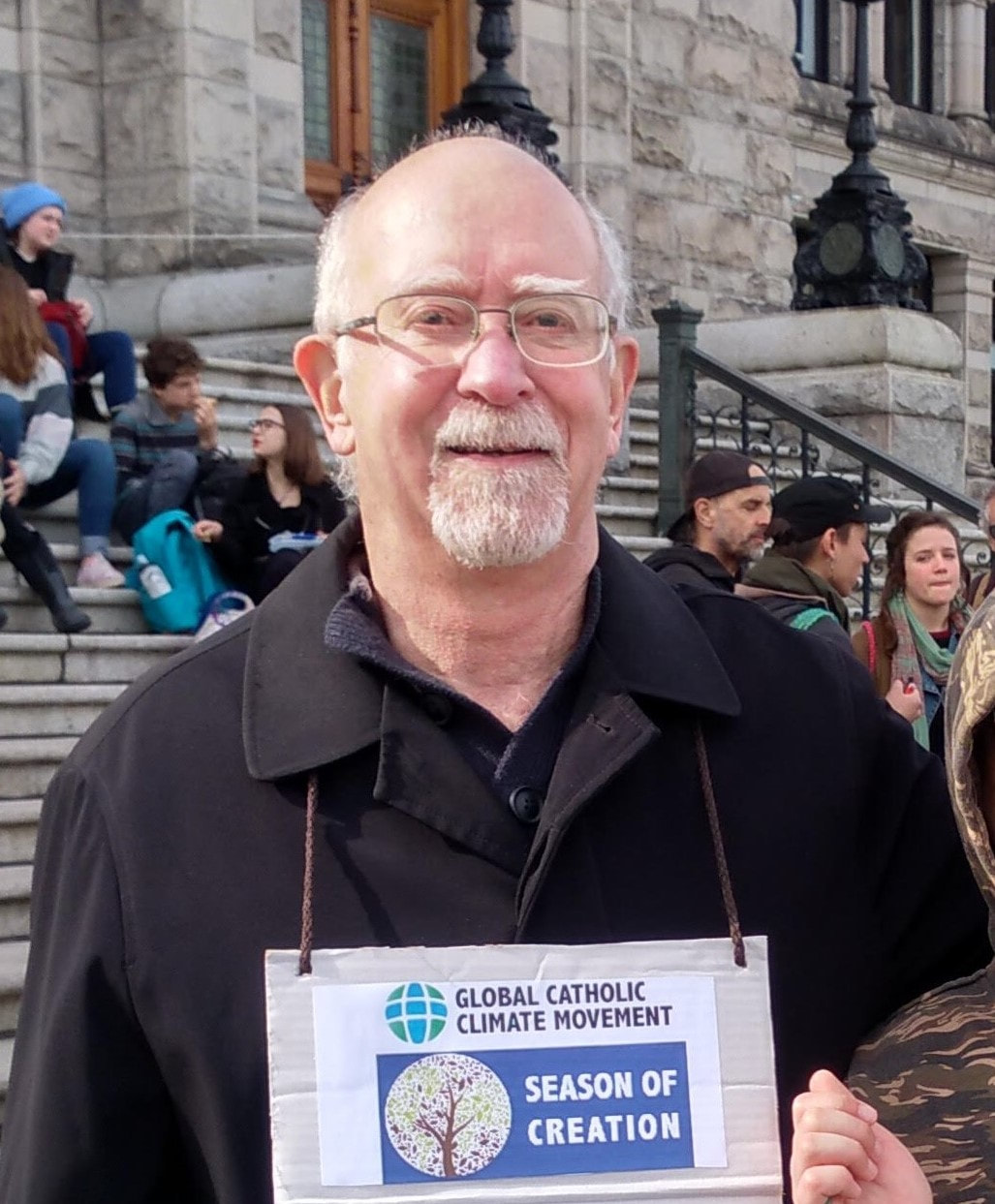Fratelli Tutti - Pope Francis
Let us also consider the Pope’s latest encyclical Fratelli Tutti. Here is a very informative discussion:
However, you may not have the time (56 mins) to listen to the discussion or read Fratelli tutti: On Fraternity and Social Friendship which is 276 pages long.
So permit your JPIC and Laudato Si’ Animator to do his job and give you a 3 page summary including a few points that caught his attention!
- Fratelli tutti was published 4 Oct 2020, the feast of Saint Francis of Assisi.
- Both Laudato si’ (LS) and Fratelli tutti (FT) start with words of St Francis.
- Chapter 1 describes the sad state of the world. Although depressing, there is hope. "Difficulties that seem overwhelming," the Pope writes, "are opportunities for growth, not excuses for a glum resignation that can lead only to acquiescence." (78) Difficulties cited: the manipulation and deformation of concepts such as democracy, freedom, justice; the loss of the meaning of the social community and history; selfishness and indifference toward the common good; the prevalence of a market logic based on profit and the culture of waste; unemployment, racism, poverty; the disparity of rights and its aberrations such as slavery, trafficking, women subjugated and then forced to abort, organ trafficking (10-24). Global problems call for global actions, emphasizes the Pope, also sounding the alarm against a “culture of walls” that favours the proliferation of organized crime, fuelled by fear and loneliness (27-28).
- Chapter 2, a meditation on the parable of the good Samaritan, could make good material for fraternity and parish discussion groups. We all, in fact, are co-responsible in creating a society that is able to include, integrate and lift up those who have fallen or are suffering (77). Love builds bridges and “we were made for love” (88). We must recognize Christ in the face of every excluded person (85).
- Chapters 3 and 4 present the Pope's fundamental vision. “The spiritual stature of a person’s life is measured by love, which always “takes first place” and leads us to seek better for the life of the other, far from all selfishness (92-93). The sense of solidarity and of fraternity begin within the family, which are to be safeguarded and respected in their “primary and vital mission of education” (114).
- This love must extend beyond family, tribe and nation to strangers, migrants and all people into a social friendship where the worth of every person is acknowledged. Chapter 3&4 are foundational to the Pope’s approach to humanity and its problems.
- Chapter 5 presents the Pope's political philosophy, Chapter 6 is on the importance of social and cultural values, and Chapter 7 deals with reconciliation and peace building. If only politicians and world leaders would read these chapters, which stress that we should see everyone as our brother and sister and treat them with kindness and respect.
- Finally, Chapter 8 speaks of the role of religion in building fraternity. This chapter will be especially useful for ecumenical and inter-religious dialogues.
So now to some points.
- The phrase fratelli tutti is taken from St. Francis of Assisi’s “sixth admonition” to the friars, all of whom were men. In Italian, fratelli means brothers or brothers and sisters since, in many Romance languages, including Spanish spoken in the Pope’s native Argentina, the masculine form of nouns is traditionally used when referring to males and females collectively. The Pope acknowledges this: “1. “FRATELLI TUTTI”.[1] With these words, Saint Francis of Assisi addressed his brothers and sisters and proposed to them a way of life marked by the flavour of the Gospel.”
- Dan Horan, OFM says: The reason that St. Francis preferred the title "brother" was simple: He truly meant that he saw himself as inherently related to all women, men, and even nonhuman creatures as part of God's one family of creation. To talk about fraternity as a disposition or value is to talk about how you view and relate to other people, including strangers and those who may be very different from you. It is about recognizing intrinsic familial ties with all people and creatures.” [i.e. universal kinship with creation as OFS Rule 18 puts it].
- Dan Horan goes on to say that these three themes are the bases of FT: Fraternity; Crossing borders, building bridges; & Peacemaking and reconciliation.
- FT is a sibling of LS and continues the thread of Common Home, Common Family, and integral human development encapsulated in the phrase: “cry of the earth, cry of the poor.” Not much is actually new; rather it is a restating of accepted Catholic Social Teaching and Pope Francis’ thought in some detail and sharply focused. It is more an assertion of values, not a prescription of solutions.
- It also continues the idea of reaching out, going outside to the streets to evangelise as espoused in Evangelii Gaudium (Joy of the Gospel, 2013). It draws on the parable of the Good Samaritan and its solidarity with neighbours without borders (3-8 & ) and universal (catholic!) friendship.
- It calls for a new politics; from fragmentation to unity; from nationalism to international and multi-nationalism i.e. unity in diversity globally and locally.
- It talks about the causes of migration being examples of unfairness in the present world system and again reminds us that politics can be one of the highest forms of charity; but nationalistic populism is not a good example. With their lives “at stake” (37), fleeing from war, persecution, natural catastrophes, unscrupulous trafficking, ripped from their communities of origin, migrants are to be welcomed, protected, supported and integrated. Unnecessary migration needs to be avoided, Pope Francis affirms, by creating concrete opportunities to live with dignity in the countries of origin.
- The theme of the fifth chapter is A better kind of politics, which represents one of the most valuable forms of charity because it is placed at the service of the common good (180) and recognizes the importance of people, understood as an open category, available for discussion and dialogue (160). This is the populism indicated by Francis, which counters that populism which ignores the legitimacy of the notion of people, by attracting consensuses in order to exploit them for its own service and fomenting selfishness in order to increase its own popularity (159). But a better politics is also one that protects work, an “essential dimension of social life”.
- FT does not decry capitalism or business, as such, merely the excess of these when ruled only by the market and greed as opposed to sharing. The undue influence of finance and the free market needs to be curbed. The Pope writes that the free market cannot resolve every problem, and specifically condemns trickle-down economics as “this dogma of neo-liberal faith.” A politics centred on human dignity and not subjected to finance because “the marketplace, by itself, cannot resolve every problem” is needed.
- The Pope also calls us to consider “an ethics of international relations” (126), because every country also belongs to foreigners and the goods of the territory cannot be denied to those who are in need and come from another place. Thus, the natural right to private property will be secondary to the principal of the universal destination of created goods (120).
- The Pope has decried plundering rather than sharing. In Catholic Social Teaching sharing follows the principle of: the universal destination of goods (120) and profit and private property are subject to a social mortgage.
- We must move from destruction to caring for our common home and family. Specifically it is almost impossible to wage a “just war” because of the excessively destructive nature of modern weapons. We must divest from fossil fuels and military weapons and re-invest in sustainable economic activity especially production of food. The total elimination of nuclear arms is “a moral and humanitarian imperative”. With the money invested in weapons, the Pope suggests instead the establishment of a global fund for the elimination of hunger (255-262).
- The death penalty: it is inadmissible and must be abolished worldwide. (263-269)
- The Pope warns of the dangers of a social media that has, “now given free rein to ideologies. Things that until a few years ago could not be said by anyone without risking the loss of universal respect can now be said with impunity, and in the crudest of terms, even by some political figures.”
- Pope Francis was inspired by Orthodox Patriarch Bartholomew’s passionate pleas to care for creation in writing LS and for FT the Pope recalls St. Francis' famous encounter with Sultan Malek al-Kamil at Damietta, Egypt, in 1219 and cites Grand Imam of Al-Azhar, Sheikh Ahmed Al-Tayeb and their joint declaration in Abu Dhabi, Feb 2019. That first-of-a-kind document embraced ‘brotherhood’ among different religions, but called especially for religious freedom, condemning religious persecution and radicalized religion.
- South African Anglican Bishop Desmond Tutu, was also an inspiration for his encyclical (286). Tutu is the main proponent of Ubuntu, an African humanist philosophy based on a culture of sharing, openness, mutual dependence, dialogue and interpersonal encounter. In Ubuntu, human existence reaches fulfilment as part of whole, society thrives on a common humanity, and forgiveness and reconciliation are prerequisites for preserving social harmony.
- Because kindness "entails esteem and respect for others, once kindness becomes a culture within society it transforms lifestyles, relationships and the ways ideas are discussed and compared," he writes. "Kindness facilitates the quest for consensus; it opens new paths where hostility and conflict would burn all bridges."
- This should lead to a "culture of encounter," he says, where people "should be passionate about meeting others, seeking points of contact, building bridges, planning a project that includes everyone."
- The Pope underlines that peace is connected to truth, justice and mercy; it is “proactive” and aims at forming a society based on service to others and on the pursuit of reconciliation and mutual development (227-229).
- Pope Francis concludes his Encyclical, remembering Martin Luther King, Desmond Tutu, Mahatma Gandhi and above all Blessed Charles de Foucauld, a model for everyone of what it means to identify with the least in order to become “the universal brother” (286-287). The final words of the Encyclical come from two prayers, namely one “to the Creator” and the “Ecumenical Christian Prayer,” praying that the heart of mankind may harbour “a spirit of fraternity.”
Peace & joy, Andrew, ofs
On-Going Formation:
See the November Living Fraternity on-going formation issue which focuses on Fratelli Tutti
Further reading:
https://www.vaticannews.va/en/pope/news/2020-10/fratelli-tutti-pope-fraternity-social-friendship-short-summary.html
Dan Horan, OFM: https://www.ncronline.org/news/opinion/faith-seeking-understanding/relationship-leads-us-peace-three- key-franciscan-themes



 RSS Feed
RSS Feed